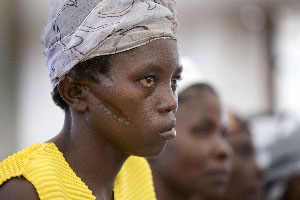Announcements
Make Every Woman Count would like you to join its efforts to contribute to the global campaign to end gender violence "Militarism and Sexual Violence Against Women in Africa."
This year, we have decided to pick 16 African countries and write short articles highlighting their country-specific issues around Violence against Women and Gender-Based Violence on our website on this year’s theme: “From Peace in the Home to Peace in the World: Let’s Challenge Militarism and End Violence Against Women!”.
This series is in conjunction with the international campaign: 16 Days of Activism Against Gender Violence that symbolically runs from 25 November, International Day Against Violence Against Women to 10 December, International Human Rights Day, in order to underline that violence against women is a violation of their human rights.
Throughout the 16 days Make Every Woman Count will be featuring articles exploring this year’s theme: “From Peace in the Home to Peace in the World: Let’s Challenge Militarism and End Violence Against Women!” 
The goal will be to run an article discussing one or more of these themes from 16 African countries each day of the campaign from 25 November to 10 December.
Africa has a long history of militarism beginning with the birth of many of Africa’s nations. Shortly after independence, in most cases as a result of violent struggle, African states were entangled in Cold War politics, the arms race and proxy wars. Coup d’etats, civil conflicts and military governments became the rule and not the exception.
“By the mid-1970s more than half of Africa was under military rule, and between 1990 and 2005, no fewer than 23 nations were involved in conflict, with an average cost per year of US $18 billion to African economies,” write Amina Mama and Margo Okazawa-Rey in their editorial Militarism, Conflict and Women’s Activism.
Today, violent conflicts, largely intrastate, cost the region and estimated US $3 billion per year and military spending. And arms continue to flood into the continent as Cold War politics have been replaced by those of the War on Terror declared by the United States in 2001.
Violent conflicts, the most harmful manifestations of militarism, which the campaign defines as: “an ideology that creates a culture of fear and supports the use of violence, aggression, or military interventions for settling disputes and enforcing economic and political interests,” disproportionately impact women and children. They are killed, maimed, tortured, raped, or displaced, among other harmful affects.
During the conflicts in Uganda, Liberia, Sierra Leone, Sudan, Guinea, Rwanda and across the continent throughout the 20th century hundreds of thousands of women and girls have been victims of sexual violence and exploitation. Between 250,000–500,000 women and girls were raped during the 1994 genocide in Rwanda. In the Democratic Republic of Congo it is estimated that more than 400,000 women have been raped during the last decade of fighting. And of the 50 million uprooted people around the world, women and children account for 80%.
But the 16 days of activism seeks to go beyond raising awareness of violence against women during wartime. It seeks to stop a culture of militarism that promotes a masculinity that equates strength with violence and power. Militarism, as it is, induces and perpetuates gender-based violence, against women and men in the form of domestic violence, and structural violence. Militarism shatters women’s lives, destroys their environment, and endangers their health and the health of their family. It also undermines democracy, human rights and economic development. It cannot be allowed to continue.
It is our hope that this series will shed light on these negative impacts of militarism and contribute to a more peaceful and secure 21st century for women in Africa.
About the 16 days of Activism:
The ‘16 Days of Activism Against Gender Violence’ is an international movement to end gender violence. Born in 1991 during the first meeting of the Women’s Global Leadership Institute, the campaign runs symbolically from 25 November, International Day Against Violence Against Women to 10 December, International Human Rights Day, in order to underline that violence against women is a violation of their human rights.
More than 3, 700 organizations in approximately 164 countries have participated in the 16 Days Campaign since 1991 and this year MEWC would like to be one of them.
Militarism remains a key source of violence for women. As an ideology that creates a culture of fear, militarism supports the use of violence, aggression, and military interventions for settling disputes and enforcing economic and political interests. The impacts of militarism run deep, with material, institutional, cultural, and psychological impacts on all of our communities. It privileges violent forms of masculinity, and presumes that violence is an effective way to solve problems. Militarism often has grave consequences for the safety and security of our society as a whole, including women, children, and men. From sexual violence in conflict to the proliferation of toy guns for children, militarism influences how we view women and men, our families, neighbors, public life, and specific countries.
The sub-themes of the Campaign this year are:
- Sexual and gender-based violence committed by state agents, particularly the police or military
- Proliferation of small arms and their role in domestic violence
- Sexual violence in and after conflict
